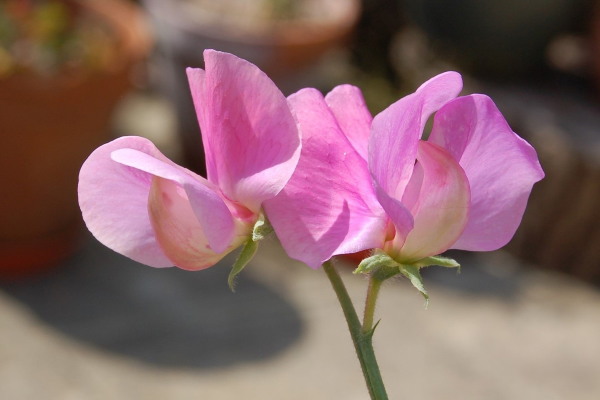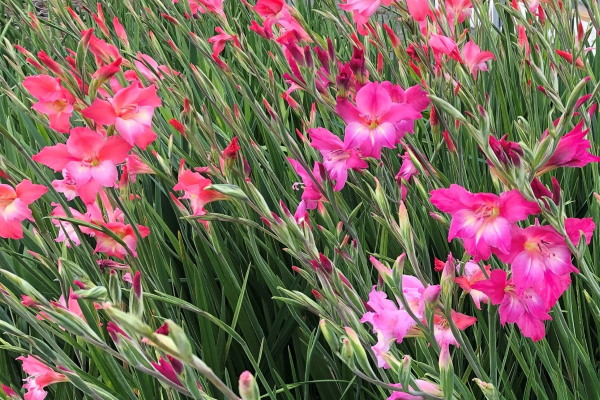A collection of plant varieties named after, or associated with, 20th century English horticulturalist Ellen Willmott (1858-1934) has been awarded National Plant Collection status by Plant Heritage.
The new collection, which is located in a private garden near Ipswich in Suffolk, celebrates the life, times and work of Ellen Willmott. An influential member of the Royal Horticultural Society, Ellen Willmott is thought to have cultivated over different types of plants during her career, and to date has over 40 plant varieties named after her or her home in Essex.
Ellen Willmott was not only renowned for her gardening prowess, but also for the myths and eccentricities that surrounded her later years. It’s believed she secretly planted Eryngium giganteum – a huge spikey plant also known as Miss Willmott’s ghost – in the gardens of unsuspecting friends and fellow gardeners.
The new collection embraces this curious tale, and so far comprises 11 cultivars all relating to Ellen Willmott or Warley Place (her home) including Lathyrus odoratus ‘Miss Willmott’, Rosa ‘Ellen Willmott’ and Iris willmottiana 'Alba'. Nick Stanley, the owner of this quirky collection, hopes to one day spread the seeds of various cultivars to different gardens too, echoing the myth of Ellen Willmott – except this time, the owners will be in agreement.
Vicki Cooke, Conservation Manager at Plant Heritage explains: “The extensive research undertaken really piqued our interest in this collection; whilst Nick and colleagues were looking for long-lost varieties of daffodils, Ellen Willmott’s home (Warley Place) and gardens were rediscovered. Nick investigated further, finding letters written by Willmott and some of her plant notebooks too. This fascinating piece of horticultural history could have easily been lost, but now, thanks to Nick and his growing collection of Ellen Willmott and Warley Place related plants, her life and legacy will live on.”

Lathyrus odoratus 'Miss Willmott'. Credit: N Stanley
Seven other National Plant Collections accredited
Plant Heritage has also awarded a further seven new National Plant Collections, ranging from the north of England - notably Yorkshire and Lancashire - to the southern coastlines of Dorset and Kent. The new collections include:
- The first ever Gladiolus (Nanus) collection, located in Glamorgan
- A spikey yet striking Eryngium collection in North Yorkshire, showing that there is more to this genus than the ghost of Miss Willmott
- A Siberian Iris collection in Dorset containing cultivars imported from the USA over the last 30 years
- A Hampshire-based collection of lavender cultivars (Lavendula x intermedia)
- 50 Athyrium filix-femina (ferns) in Lancashire
- A Saxifraga fortunei collection in Kent, inspired by a love for Japanese culture and gardening
- A colourful collection of Ipheion sessile and Ipheion uniflorum also in Kent, and also the first of its kind.

Gladiolus (Nanus) cvs. Credit: R Evans Pheasant Acre Plants
Vicki adds: “We are excited to award the first ever Gladiolus (Nanus cvs.) collection, which is held at Pheasant Acre Plants in Glamorgan. These beautiful garden plants are making a bit of a comeback, having been deemed somewhat unfashionable in the past. Their unique look – shorter than traditional gladioli, with flowers that boast an array of colours from apricot gold to salmon pink – really sets them apart from other plants and adds a touch of magic to any garden.”
Plant Heritage has over 650+ National Plant Collections all across the country, from mighty oaks to miniature orchids. To find details of these collections, and to see if they’re open for socially-distanced visits or are offering virtual tours instead, search The National Plant Collections.
Plant Heritage is the only national charity working to ensure that cultivated plants are cared for and nurtured, so that future generations can enjoy rare plants as much as we currently do. This is made possible via its National Plant Collection Scheme, Plant Guardians, local groups and members.
For more in formation
formation
Plant Heritage
www.plantheritage.org.uk
